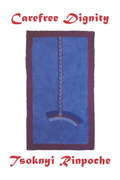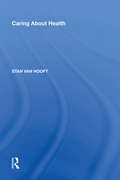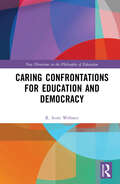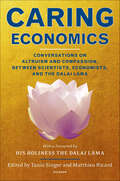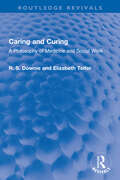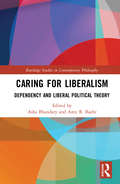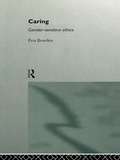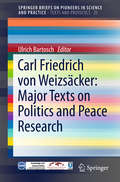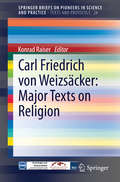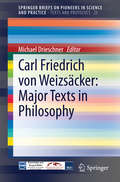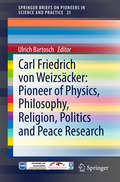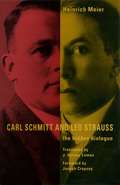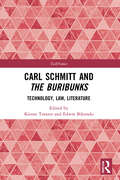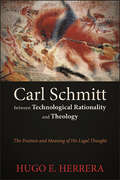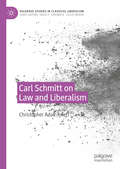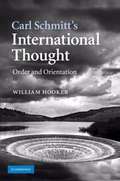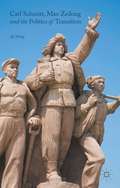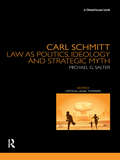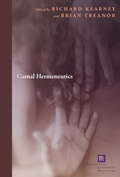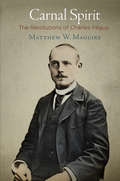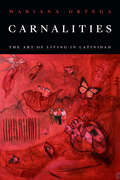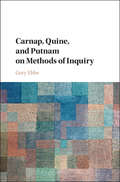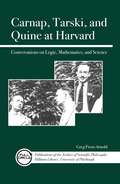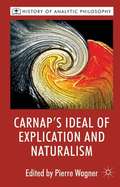- Table View
- List View
Carefree Dignity
by Erik Pema Kunsang Marcia Binder Schmidt Rinpoche Tsoknyi Drubwang, Rinpoche Tsoknyi DrubwangTsoknyi Rinpoche's teaching style embodies a vividness that is a play between himself and his audience. His immediateness includes gestures and examples that entice us to understanding. Through guided meditations he offers direct participation as a delightful enhancement to our practice. Simple, straightforward and profound, Carefree Dignity is a book that captivates our intellect while enriching our awareness.From the Trade Paperback edition.
Caring About Health (Ashgate Studies In Applied Ethics Ser.)
by Stan van HooftPresenting a philosophical exploration of the ideas central to health care practice this book explores such concepts as caring, health, disease, suffering and pain from a phenomenological perspective. With deep philosophical insight this book draws out, not only the ethical demands that arise when one encounters these phenomena, but also the forms of ethical education that would help health care workers respond to those demands. This is a book which explores the grounds for ethical living rather than enunciating ethical principles. Van Hooft argues that ethical responses arise from sensitive and insightful awareness of what is salient in clinical and other health care settings. This book draws upon thinkers from the classical canon, the Anglo-American tradition and from continental philosophical ideas.
Caring Autonomy
by Katri LõhmusDespite its absence in the written text of the European Convention on Human Rights, the European Court of Human Rights now regularly uses the concept of autonomy when deciding cases concerning assisted dying, sexuality and reproductive rights, self-determination, fulfilment of choices and control over body and mind. But is the concept of autonomy as expressed in the ECtHR reasoning an appropriate tool for regulating reproduction or medical practice? Caring Autonomy reveals and evaluates the type of individual the ECtHR expresses and shapes through its autonomy-based case law. It claims that from a social and ethical perspective, the current individualistic interpretation of the concept of autonomy is inadequate, and proposes a new reading of the concept that is rooted in the acknowledgment and appreciation of human interdependence and the importance of interpersonal trust and care.
Caring Confrontations for Education and Democracy (New Directions in the Philosophy of Education)
by R. Scott WebsterCaring Confrontations for Education and Democracy makes a compelling case for redirecting current practices of education to focus on being educated rather than having an education. The book offers a detailed analysis of how an education for democracy must encourage commitment to important ideals and strengthen the vulnerabilities of people which make them easily manipulated by politicians and the media. It addresses the need for education that focusses on people’s mode of being, so that in addition to becoming knowledgeable and skilful, people develop the disposition that is more appropriate for democratic living. Through embodying this approach of authentic spiritual growth through education, this book explores the idea of caring confrontations and critical reflection to enable personal change and growth. Providing a thoughtful analysis of the role of education in democracy, the book will be of great interest to researchers, academics, and students in the fields of philosophy of education, educational theory and democratic education.
Caring Economics: Conversations on Altruism and Compassion, Between Scientists, Economists, and the Dalai Lama
by Tania Singer and Matthieu RicardA COLLECTION OF INTERNATIONALLY RENOWNED SCIENTISTS AND ECONOMISTS IN DIALOGUE WITH HIS HOLINESS THE DALAI LAMA, ADDRESSING THE NEED FOR A MORE ALTRUISTIC ECONOMYCan the hyperambitious, bottom-line-driven practices of the global economy incorporate compassion into the pursuit of wealth? Or is economics driven solely by materialism and self-interest? In Caring Economics, experts consider these questions alongside the Dalai Lama in a wide-ranging, scientific-based discussion on economics and altruism. Begun in 1987, the Mind and Life Institute arose out of a series of conferences held with the Dalai Lama and a range of scientists that sought to form a connection between the empiricism of contemporary scientific inquiry and the contemplative, compassion-based practices of Buddhism. Caring Economics is based on a conference held by the Mind and Life Institute in Zurich in which experts from all over the world gathered to discuss the possibility of having a global economy focused on compassion and altruism. Each chapter consists of a presentation by an expert in the field, followed by a discussion with the Dalai Lama in which he offers his response and his own unique insights on the subject. In this provocative and inspiring book, learn how wealth doesn't need to be selfish, how in fact, empathy and compassion may be the path to a healthier world economy.
Caring and Curing: A Philosophy of Medicine and Social Work (Routledge Revivals)
by Elizabeth Telfer Robert (R. DownieFirst published in 1980, Caring and Curing is for all those involved in the ‘caring professions’ – medicine, social work, and the other health and welfare occupations. It is both an introduction to philosophy for the caring professions and a philosophy of those professions. The authors believe that the best way to introduce philosophy is to engage in it, to philosophize, and that the most exciting way to philosophize is to offer a reasoned but controversial point of view on matters to which people are professionally committed. They argue, first, that there is an essential unity of the caring professions in that the concepts of health and welfare are different aspects of a single value judgement as to what sort of life a person should be enabled to live in his society. Secondly, they show the limits of scientific expertise in relation to human behaviour and argue that the education of medical and social workers should include broader humane disciplines to assist them in coping with the problems of ethics and values of all kinds in present-day society. Thus, the discussion introduces the main branches of philosophy and deals with many of the current moral dilemmas in medicine and social work.
Caring for Liberalism: Dependency and Liberal Political Theory (Routledge Studies in Contemporary Philosophy)
by Asha Bhandary Amy R. BaehrCaring for Liberalism brings together chapters that explore how liberal political theory, in its many guises, might be modified or transformed to take the fact of dependency on board. In addressing the place of care in liberalism, this collection advances the idea that care ethics can help respond to legitimate criticisms from feminists who argue that liberalism ignores issues of race, class, and ethnicity. The chapters do not simply add care to existing liberal political frameworks; rather, they explore how integrating dependency might leave core components of the traditional liberal philosophical apparatus intact, while transforming other aspects of it. Additionally, the contributors address the design of social and political institutions through which care is given and received, with special attention paid to non-Western care practices. This book will appeal to scholars working on liberalism in philosophy, political science, law, and public policy, and it is a must-read for feminist political philosophers.
Caring: Gender-Sensitive Ethics
by Peta BowdenIn Caring, Peta Bowden extends and challenges recent debates on feminist ethics. She takes issue with accounts of the ethics of care that focus on alleged principles of caring rather than analysing caring in practice. Caring, Bowden argues, must be understood by 'working through examples'. Following this approach, Bowden explores four main caring practices: mothering, friendship, nursing and citizenship. Her analysis of the differences and similarities in these practices - their varying degrees of intimacy and reciprocity, formality and informality, vulnerability and choice - reveals the practical complexity of the ethics of care. Caring recognizes that ethical practices constantly outrun the theories that attempt to explain them, and Bowden's unique approach provides major new insights into the nature of care without resorting to indiscriminate unitary models. It will be essential reading for all those interested in ethics, gender studies, nursing and the caring professions.
Carl Friedrich von Weizsäcker: Major Texts On Politics And Peace Research (SpringerBriefs on Pioneers in Science and Practice #25)
by Ulrich BartoschThis book offers a collection of texts by Carl Friedrich von Weizsaecker (1912-2007), a major German universal scientist who was also a pioneer in physics, philosophy, religion on issues of politics and peace research. He worked with Werner Heisenberg and Otto Hahn in the German "Uranverein", obtained a patent for plutonium during World War II and was an opponent of the nuclear armament of the German armed forces (1957). Furthermore, he published a study on the inability to defend Germany (1971) that was instrumental in the debate on defensive defense since the mid 1970s. He wrote on war and peace, peace and truth, policy implications of nuclear energy, on ethical issues of modern strategy, on consequences of war and war prevention and on the theory of power. He coined the term "world domestic policy" which still covers a valid theory for political, institutional secured world peace in the atomic age.
Carl Friedrich von Weizsäcker: Major Texts On Religion (SpringerBriefs on Pioneers in Science and Practice #24)
by Konrad RaiserThis book presents a collection of texts by the German physicist and philosopher Carl Friedrich von Weizsäcker (1912-2007) in English, for use in seminars on the philosophy of religion, the comparative study of religion, but as well on the relationship between religion and the scientific worldview. Most texts appear in English for the first time. Weizsäcker became famous through his works in physics, mainly in the early development of nuclear physics. Later he would also become well known as a philosopher and analyst of contemporary culture. He also worked very intensely on projects for the prevention of nuclear war and for peace in general.
Carl Friedrich von Weizsäcker: Major Texts in Philosophy (SpringerBriefs on Pioneers in Science and Practice #23)
by Michael DrieschnerThis book presents a collection of texts by the German philosopher and physicist Carl Friedrich von Weizsäcker (1912-2007), for use in seminars on philosophy, mainly epistemology and the philosophy of physics or foundations of quantum mechanics, but also for courses on German philosophy of the 20th century or the philosophy of science. Most texts appear in English for the first time. Weizsäcker became famous through his works in physics, later becoming well known as a philosopher and an analyst of contemporary culture and politics. He worked intensively on projects for the prevention of nuclear war and for peace in general. - Texts about classical philosophy are included as well as on logic, on the philosophy of biology and on the philosophy of mathematics, on "death" as well as on "power".
Carl Friedrich von Weizsäcker: Pioneer Of Physics, Philosophy, Religion, Politics And Peace Research (SpringerBriefs on Pioneers in Science and Practice #21)
by Ulrich BartoschThis book offers a collection of texts by Carl Friedrich von Weizsaecker (1912-2007), a major German universal scientist who was a pioneer in physics, philosophy, religion, politics and peace research. He started as an assistant to the physicist, Werner Heisenberg, held professorships in theoretical physics (Strasbourg), physics (Goettingen) and philosophy (Hamburg) and was a co-director (with Juergen Habermas) of a Max Planck Institute for Research into living conditions in a world of science and technology in Starnberg. This unique anthology spans the wide scope of his innovative thinking including his philosophical self-reflections, on peace, nuclear strategy, security and defensive defense, on nuclear energy, on the conditions of freedom, on his experience of religion, including poetry from his early youth. Most texts appear in English for the first time and are selected for use in seminars on physics, philosophy, religion, politics and peace research.
Carl Schmitt and Leo Strauss: The Hidden Dialogue
by Heinrich MeierCarl Schmitt was the most famous and controversial defender of political theology in the twentieth century. But in his best-known work, The Concept of the Political, issued in 1927, 1932, and 1933, political considerations led him to conceal the dependence of his political theory on his faith in divine revelation. In 1932 Leo Strauss published a critical review of Concept that initiated an extremely subtle exchange between Schmitt and Strauss regarding Schmitt’s critique of liberalism. Although Schmitt never answered Strauss publicly, in the third edition of his book he changed a number of passages in response to Strauss’s criticisms. Now, in this elegant translation by J. Harvey Lomax, Heinrich Meier shows us what the remarkable dialogue between Schmitt and Strauss reveals about the development of these two seminal thinkers. Meier contends that their exchange only ostensibly revolves around liberalism. At its heart, their “hidden dialogue” explores the fundamental conflict between political theology and political philosophy, between revelation and reasonand ultimately, the vital question of how human beings ought to live their lives. “Heinrich Meier’s treatment of Schmitt’s writings is morally analytical without moralizing, a remarkable feat in view of Schmitt’s past. He wishes to understand what Schmitt was after rather than to dismiss him out of hand or bowdlerize his thoughts for contemporary political purposes.”—Mark Lilla, New YorkReview of Books
Carl Schmitt and The Buribunks: Technology, Law, Literature (TechNomos)
by Kieran TranterIn 1918 a young Carl Schmitt published a short satirical fiction entitled The Buribunks. He imagined a future society of beings who consistently wrote and disseminated their personal diaries. Schmitt would go on to become the infamous philosopher of the exception and for a while the ‘Crown Jurist of the Third Reich’. The Buribunks – ironically for beings that lived only for self-memorialisation – has been mostly lost to history. However, the digital realm, with its emphasis on the informatic traces generated by human doing, and the continual interest in Schmitt’s work to explain and criticise contemporary constellations of power, suggests that The Buribunks is a text whose epoch has come. This volume includes the first full translation into English of The Buribunks and a selection of critical essays on the text, its meanings in the digital present, its playing with and criticism of the literary form, and its place within Schmitt’s life and work. The Buribunks and the essays provide a complex, critical and provocative invitation to reimagine the relations between the human and their imprint and legacy within archives and repositories. There is a fundamental exploration of what it means to be a being intensely aware of ‘writing itself’. This is not just a volume for critical lawyers, literary scholars and the Schmitt literati. It is a volume that challenges a broad range of disciplines, from philosophy to critical data studies, to reflect on the digital present and its assembled and curated beings. It is a volume that provides a set of fantastically located concepts, images and histories that traverse ideas and practices, play and politics, power and possibility.
Carl Schmitt between Technological Rationality and Theology: The Position and Meaning of His Legal Thought
by Hugo E. HerreraCarl Schmitt, one of the most influential legal and political thinkers of the twentieth century, is known chiefly for his work on international law, sovereignty, and his doctrine of political exception. This book argues that greater prominence should be given to his early work in legal studies. Schmitt himself repeatedly identified as a jurist, and Hugo E. Herrera demonstrates how for Schmitt, law plays a key role as an intermediary between ideal, conceptual theory and the complexity of practical, concrete situations. Law is concerned precisely with balancing the extremes of theory and reality, and in this respect, Schmitt associates it with philosophical thinking broadly as being able to understand and explain the tensions in human experience. Reviewing and analyzing prevailing interpretations of Schmitt by Jacques Derrida, Heinrich Meier, and others, Herrera argues that the importance of Schmitt's legal framework is both significant and overlooked.
Carl Schmitt on Law and Liberalism (Palgrave Studies in Classical Liberalism)
by Christopher Adair-ToteffThis book is an investigation into Carl Schmitt’s critical thinking regarding the alleged deficiencies he identified in modern liberalism. Noted jurist, constitutional scholar, and a fierce critic of liberalism and pluralism, Schmitt mounted a sustained attack on the defects of the Weimar constitution between 1916 and 1934, contending that what Germany needed was a strong decisive leader to maintain political unity. This book provides a concise and clear explanation of Schmitt’s disagreements with other constitutional scholars, from his time as a university graduate up until Hitler’s rise to power. Although these disagreements were couched in legal terminology, they represented political criticisms that went directly to the heart of modern democracy, culminating in Schmitt's defence of the Reich against Prussia in the constitutional crisis of 1932. The book concludes with a strenuous defence of modern liberalism in response to the Schmittian critique. Thus, this book is not just an exploration of Carl Schmitt’s work, but a response to one of the harshest attacks on the modern liberal state, and a blueprint for a renewal of democracy, pluralism, and the rule of law.
Carl Schmitt's International Thought
by William HookerAn unrepentant Nazi, Carl Schmitt remains one of the most divisive figures in twentieth century political thought. In recent years, his ideas have attracted a new and growing audience. This book seeks to cut through the controversy surrounding Schmitt to analyze his ideas on world order. In so doing, it takes on board Schmitt's critique of the condition of order in late modernity, and considers Schmitt's continued relevance. Consideration is given to the two devices Schmitt deploys, the Grossraum and the Partisan, and argues that neither concept lives up to its claim to transcend or reform Schmitt's pessimistic history of the state. The author concludes that Schmitt's continuing value lies in his provocative historical critique, rather than his conceptual innovation.
Carl Schmitt, Mao Zedong and the Politics of Transition
by Qi ZhengThis book develops a new way of reading and benefiting from Schmitt's legal and political theories. It explores Schmitt's theories from the perspective of what I refer to as the politics of transition. It also contributes to identifying the real theoretical relationship between Schmitt and Mao.
Carl Schmitt: Law as Politics, Ideology and Strategic Myth (Nomikoi: Critical Legal Thinkers)
by Michael G. SalterThere continues to be a remarkable revival in academic interest in Carl Schmitt's thought within politics and social theory but this is the first book to address his thought from an explicitly legal theoretical perspective. Transcending the prevailing one-sided and purely historical focus on Schmitt’s significance for debates that took place in the Weimar Republic 1919-1933, this book addresses the actual and potential significance of Schmitt's thought for controversies within contemporary Anglo-American legal theory that have emerged during the past three decades. These include: the critique of liberal forms of legal positivism; the relative ‘indeterminacy’ of legal doctrine and the need for an explicitly interpretative approach to its range of meanings, their scope and policy rationale; the centrality of discretion and judicial law-making within the legal process; the important role played by ideological prejudices and assumptions in legal reasoning; the reinterpretation of law as a form of strategically disguised politics; the legal theoretical critique of universalistic approaches to "human" rights and associated liberal-cosmopolitan 'ideologies of humanity,' including the rhetoric of 'humanitarian intervention'; and the limitations of liberal constitutionalism and liberalism more generally as an approach to law. In Carl Schmitt: Law as Politics, Ideology and Strategic Myth, the author provides an overview and assessment of Schmitt's thought, as well as a consideration of its relevance for contemporary legal thought and debates.
Carnal Hermeneutics (Perspectives in Continental Philosophy)
by Richard Kearney and Brian TreanorBuilding on a hermeneutic tradition in which accounts of carnal embodiment are overlooked, misunderstood, or underdeveloped, this work initiates a new field of study and concern.Carnal Hermeneutics provides a philosophical approach to the body as interpretation. Transcending the traditional dualism of rational understanding and embodied sensibility, the volume argues that our most carnal sensations are already interpretations. Because interpretation truly goes “all the way down,” carnal hermeneutics rejects the opposition of language to sensibility, word to flesh, text to body.In this volume, an impressive array of today’s preeminent philosophers seek to interpret the surplus of meaning that arises from our carnal embodiment, its role in our experience and understanding, and its engagement with the wider world.
Carnal Spirit: The Revolutions of Charles Peguy
by Matthew W. MaguireIt is rare for a thinker of Charles Péguy's considerable stature and influence to be so neglected in Anglophone scholarship. The neglect may be in part because so much about Péguy is contestable and paradoxical. He strongly opposed the modern historicist drive to reduce writers to their times, yet he was very much a product of philosophical currents swirling through French intellectual life at the turn of the twentieth century. He was a passionate Dreyfusard who converted to Catholicism but was a consistent anticlerical. He was a socialist and an anti-Marxist, and at once a poet, journalist, and philosopher.Péguy (1873-1914) rose from a modest childhood in provincial France to a position of remarkable prominence in European intellectual life. Before his death in battle in World War I, he founded his own journal in order to publish what he thought most honestly, and urgently, needed to be said about politics, history, philosophy, literature, art, and religion. His writing and life were animated by such questions as: Is it possible to affirm universal human rights and individual freedom and find meaning in a national identity? How should different philosophies and religions relate to one another? What does it mean to be modern?A voice like Péguy's, according to Matthew Maguire, reveals the power of the individual to work creatively with the diverse possibilities of a given historical moment. Carnal Spirit expertly delineates the historical origins of Péguy's thinking, its unique trajectory, and its unusual position in his own time, and shows the ways in which Péguy anticipated the divisions that continue to trouble us.
Carnalities: The Art of Living in Latinidad
by Mariana OrtegaIn Carnalities, Mariana Ortega presents a phenomenological study of aesthetics grounded in the work of primarily Latinx artists. She introduces the idea of carnal aesthetics informed by carnalities, creative practices shaped by the self’s affective attunement to the material, cultural, historical, communal, and spiritual. For Ortega, carnal aesthetics offers a way to think about the affective and bodily experiences of racialized selves. Drawing on Gloria Anzaldúa, Chela Sandoval, José Esteban Muñoz, Alia Al-Saji, Helen Ngo, Maurice Merleau-Ponty, Roland Barthes, and others, Ortega examines photographic works on Latinx subjects. She analyzes the photography of Laura Aguilar, Verónica Gabriela Cárdenas, and Susan Meiselas, among others, theorizing photography as a carnal, affective medium that is crucial for processes of self-formation, resistance, and mourning in Latinx life. She ends with an intimate reading of photography through a reflection of her own crossing from Nicaragua to the United States in 1979. Motivated by her experience of loss and exile, Ortega argues for the importance of carnal aesthetics in destabilizing and transforming normative, colonial, and decolonial subjects, imaginaries, and structures.
Carnap, Quine, and Putnam on Methods of Inquiry
by Gary EbbsCarnap, Quine, and Putnam held that in our pursuit of truth we can do no better than to start in the middle, relying on already-established beliefs and inferences and applying our best methods for re-evaluating particular beliefs and inferences and arriving at new ones. In this collection of essays, Gary Ebbs interprets these thinkers' methodological views in the light of their own philosophical commitments, and in the process refutes some widespread misunderstandings of their views, reveals the real strengths of their arguments, and exposes a number of problems that they face. To solve these problems, in many of the essays Ebbs also develops new philosophical approaches, including new theories of logical truth, language use, reference and truth, truth by convention, realism, trans-theoretical terms, agreement and disagreement, radical belief revision, and contextually a priori statements. His essays will be valuable for a wide range of readers in analytic philosophy.
Carnap, Tarski, and Quine at Harvard
by Greg Frost-ArnoldDuring the academic year 1940-1941, several giants of analytic philosophy congregated at Harvard: Bertrand Russell, Alfred Tarski, Rudlof Carnap, W. V. Quine, Carl Hempel, and Nelson Goodman were all in residence. This group held regular private meetings, with Carnap, Tarski, and Quine being the most frequent attendees. Carnap, Tarski, and Quine at Harvard allows the reader to act as a fly on the wall for their conversations. Carnap took detailed notes during his year at Harvard. This book includes both a German transcription of these shorthand notes and an English translation in the appendix section. Carnap's notes cover a wide range of topics, but surprisingly, the most prominent question is: if the number of physical items in the universe is finite (or possibly finite), what form should scientific discourse, and logic and mathematics in particular, take? This question is closely connected to an abiding philosophical problem, one that is of central philosophical importance to the logical empiricists: what is the relationship between the logico-mathematical realm and the material realm studied by natural science? Carnap, Tarski, and Quine's attempts to answer this question involve a number of issues that remain central to philosophy of logic, mathematics, and science today. This book focuses on three such issues: nominalism, the unity of science, and analyticity. In short, the book reconstructs the lines of argument represented in these Harvard discussions, discusses their historical significance (especially Quine's break from Carnap), and relates them when possible to contemporary treatments of these issues.Nominalism. The founding document of twentieth-century Anglophone nominalism is Goodman and Quine's 1947 "Steps Toward a Constructive Nominalism." In it, the authors acknowledge that their project's initial impetus was the conversations of 1940-1941 with Carnap and Tarski. Frost-Arnold's exposition focuses upon the rationales given for and against the nominalist program at its inception. Tarski and Quine's primary motivation for nominalism is that mathematical sentences will be 'unintelligible' or meaningless, and thus perniciously metaphysical, if (contra nominalism) their component terms are taken to refer to abstract objects. Their solution is to re-interpret mathematical language so that its terms only refer to concrete entities-and if the number of concreta is finite, then portions of classical mathematics will be considered meaningless. Frost-Arnold then identifies and reconstructs Carnap's two most forceful responses to Tarski and Quine's view: (1) all of classical mathematics is meaningful, even if the number of concreta is finite, and (2) nominalist strictures lead to absurd consequences in mathematics and logic. The second is familiar from modern debates over nominalism, and its force is proportional to the strength of one's commitment to preserving all of classical mathematics. The first, however, has no direct correlate in the modern debate, and turns upon the question of whether Carnap's technique for partially interpreting a language can confer meaningfulness on the whole language. Finally, the author compares the arguments for and against nominalism found in the discussion notes to the leading arguments in the current nominalist debate: the indispensability argument and the argument from causal theories of reference and knowledge.Analyticity. Carnap, Tarski, and Quine's conversations on finitism have a direct connection to the tenability of the analytic-synthetic distinction: under a finitist-nominalist regime, portions of arithmetic-a supposedly analytic enterprise-become empirical. Other portions of the 1940-41 notes address analyticity directly. Interestingly, Tarski's criticisms are more sustained and pointed than Quine's. For example, Tarski suggests that Gödel's first incompleteness theorem furnishes evidence against Carnap's conception of analyticity. After reconstructing this argument, Frost-Arnold concludes that it does not tell decisively against Carnap-provided that language is not trea...
Carnap’s Ideal of Explication and Naturalism
by Pierre WagnerThe book consists of a series of chapters on Carnap's ideal of explication as an alternative to the naturalistic conceptions of science, setting it in its historical context, discussing specific cases of explications, and enriching the on-going debate on conceptual engineering and naturalism in analytic philosophy.
